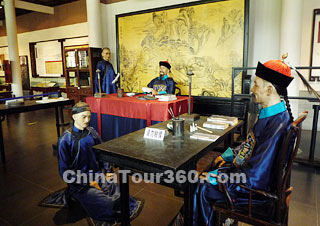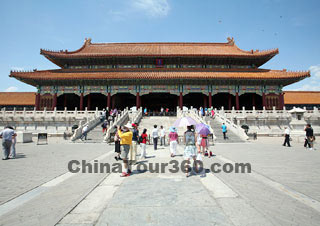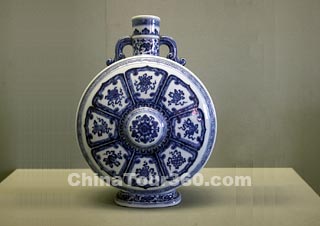
People of the Qing Dynasty
During the latter Ming Dynasty (1368 - 1644), a nomadic tribe known as the Nvzhen people once lived in what is today northeast China. The Nvzhen tribe, widely considered to be ancestors of the Manchus, became very powerful. As the Ming Dynasty went into a precipitous decline, a great leader emerged and united the Nvzhen people in 1616. His name was Nurhachi and he set up an independent regime that came to be called the Later Jin. In 1636, Nurhaichi's son, Abahai, changed the dynasty title to Qing (1644 - 1911) and moved the capital to Shenyang.
In 1644, with the help of Ming army commander Wu Sangui, the Manchu army invaded the Ming capital, Beijing, defeating the peasant uprising led by Li Zicheng. The conditions were now established for the ethnic Manchus to begin their rule over China. Qing is the last feudal dynasty in Chinese history. In the Qing's declining period, China entered the semi-colonial and semi-feudal society, due primarily to colonial intrusions.
At the beginning of the dynasty, the territory grew rapidly, encompassing Balkhash Lake in the northwest to Siberia in the north. It also spread to the Stanovoy Range and Sakhalin Island in the northeast, which extended to the Pacific Ocean. Taiwan and the affiliated islands in the southeast was part of the territory as well. Soon the Qing Dynasty became the biggest country in all of East Asia.
In order to lighten the conflicts between different classes, the Qing government implemented several agricultural programs, such as rewarding land-cultivation and a reduction in taxes. As a result of these innovative changes, the early days of the Qing Dynasty witnessed an unprecedented period of prosperity. The good times continued during the reign of three famous emperors: Kangxi, Yongzheng and Qianlong. The imperial power also became more centralized, with national strength increasing while the social order became more equitable.

Forbidden City
Although the Qing Dynasty still made progress with its diverse economic development, the economic situation became worse because its overseas trade policy was restrictive and did not allow much foreign trade. Moreover, due to its foreign policy of isolationism, China did not initially embrace the first Industrial Revolution that was occurring in the western countries. China, therefore, did not progress as rapidly as other nations in the world. When the Opium War broke out in 1840, the Qing Dynasty went to its declining period.
The western colonists coveted the extensive amount of China land available for exploitation. The Portuguese were the first colonists to establish a foothold at Macau from which they controlled the foreign trade at the port of Guangzhou. Before long, Spanish colonists arrived, followed by the British and the French. In 1840, the Opium War broke out because the unconscionable foreign capitalists intruded China. The weak-kneed Qing government was forced to sign a series of unreasonable treaties that demanded China to give up part of China's territories sovereignty, pay reparations or open trading ports. Consequently, China turned out to be a semi-feudal and semi-colonized country.
In order to pay for the expenses of war and to pay off the reparations as stated in the treaties, the Qing government imposed heavy taxes, which placed a heavy burden on the people. Finally, both the external intrusion and internal oppression led to a series of anti-feudal and anti-imperialist movements, such as the Taiping Rebellion (1851 and 1864). Forced by these pressures, the government carried out reforms, such as the Hundred-Day Reform, with aims to revitalize the Chinese nation. However, not all of the measures had much effect on the declining Qing Dynasty. It wasn't until the Revolution of 1911, led by Dr. Sun Yat-sen, that overthrew the corrupt Qing Dynasty. The Chinese nation emerged as a new, revitalized power, one that played out on the international stage. It was called the Republic of China (1912 - 1949).

A Porcelain Pot of the Qing Dynasty
![]() Great Achievements in Literature
Great Achievements in Literature
During the Qing Dynasty, there are many novels created as follows:
Dream of the Red Chamber was created by Cao Xueqin (1715 - 1763) which was included in four Chinese classical novels;
Confucian Unofficial History was a satirical novel wrote by Wu Jingzi (1701 - 1754);
Strange Tales of Liao Zhai was a collection of supernatural stories written by Pu Songling (1640 - 1715);
Imperial Collection of Four ordered to compile during the reign of Emperor Qianlong (1735 - 1796) was the highest and largest-scale series book; it collected more than 3,000 categories of classics and made great contribution to the protection of the ancient cultural heritage.







